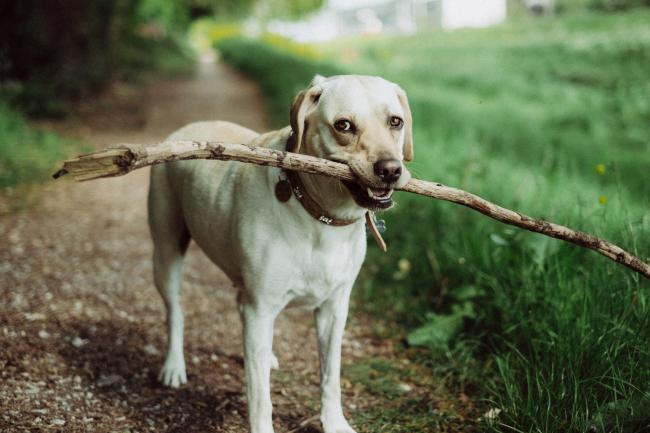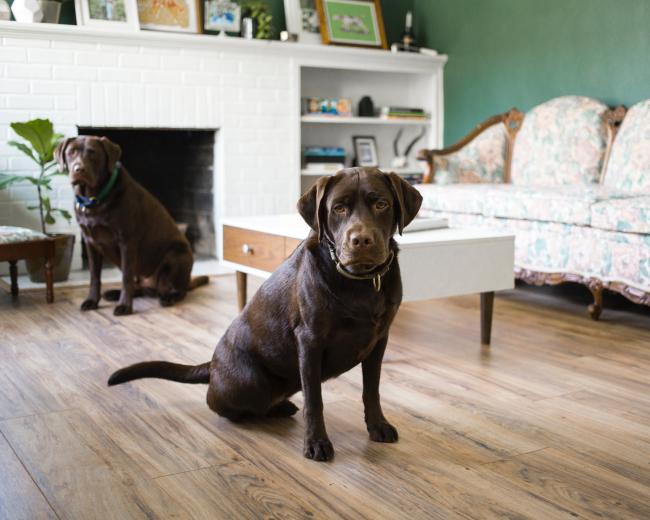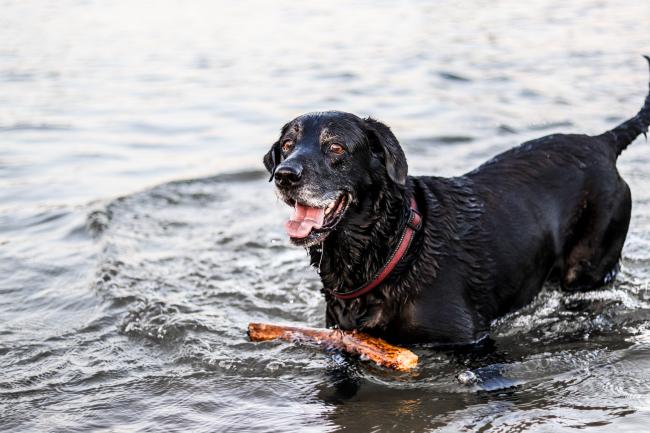Labrador Retriever: Breed Spotlight

Fact sheet
- Breed name: Labrador Retriever
- Classification: Gundogs
- Size: Large
- Coat: Short and dense
- Colour: Yellow, chocolate, black
- Personality: Friendly, high energy
- Family-friendly: Yes, though they do require early socialisation and training
- Friendly with other pets: Yes
Labrador Background
The Labrador is arguably the most popular and recognisable dog breed in the world. Their friendly, sunny nature makes them adored as family pets.
Labradors originated as working dogs in Canada and America. They are strong swimmers and were responsible for retrieving objects for hunters and fishermen. Arguably, this inquisitive, hard-working streak has passed down to the modern Labrador.
Whether working in airport security, the police or as iconic Guide Dogs, Labradors love challenges and tasks to complete. Therefore, it’s essential that they have enough mental and physical stimulation every day.
Physical Appearance of the Labrador
The Labrador is a large, athletic breed with a solid head and broad, expressive face. They have a very thick, water-resistant coat that originally helped them to swim in cold temperatures. In addition, their large, webbed paws and thick tail also help them in the water.
Labradors can weigh anywhere between 28 kg and 30 kg and stand up to 57cm tall. Their coat comes in three main shades - chocolate, yellow and black. As they age, their coat gets tinges of grey and white around the muzzle.
Labrador Behaviour and Temperament
Labradors are loyal companions that love to be around people. However, they do need early training to be manageable on a leash or around children. They are an energetic breed that thrives when given mental and physical challenges. Additionally, they have a very loud bark, making them perfect for home security!

Training and Exercising Labradors
Labradors are a high-energy dog and need training and socialising from a very early age. As such, be sure to enrol your Labrador in puppy preschool. It's also important to maintain ongoing training as they get older.
Labradors simply adore food and sometimes find it hard to stop eating. Therefore, it’s very important to manage their diet and to provide at least 30 minutes of daily exercise. If not, Labradors can quickly gain weight. Furthermore, they may display destructive behaviours such as chewing and digging.
As the Labrador is a retriever breed, they explore by 'mouthing' at objects they encounter. As such, be sure to give your Labrador plenty of chew toys to satisfy them. This will also prevent your shoes from being destroyed!
Living with a Labrador
Though they are family dogs, Labradors don’t thrive being kept indoors only. Therefore, a backyard or easy park access is best for them to enjoy the outdoors. Additionally, be sure that your yard is very secure. This is because Labradors can be clever escape artists.
You might notice your Labrador loves jumping in puddles. Be sure you lock your gated pool area to avoid them jumping in unsupervised. Instead, a bucket or tub of water can be a fun splash zone in summer!
Labradors have big appetites. As such, it’s important to encourage your Labrador to eat slowly. Additionally, be sure to keep dangerous household items out of reach. This can include shoes, kid’s toys, garbage, or, at worst, household cleaning products.
Labrador Health
The Labrador breed is prone to obesity and the health problems that can come from this. As such, it’s a good idea to speak to your vet about weight management.
There are a few conditions that Labrador owners should keep an eye out for. These include:
- Hip and elbow dysplasia
- Obesity
- Arthritis
- Seizures
- Laryngeal paralysis
Speak with your vet if you are worried: they are there to help.

Grooming
Labradors have a thick coat that will need brushing once or twice a week. You might find this increases during shedding season.
Labradors have special oils that protect and water-proof their coat. As such, be careful not to over-wash your Labrador. Doing this can damage the balance of oils in their fur. Instead, use gentle dog soap and keep it to once a month at the most.
Does your Labrador need companionship during the day? If so, we can help! A friendly Pawshake sitter can keep your Labrador entertained while you are out and about. Start searching for a perfect doggy daycare sitter today.





